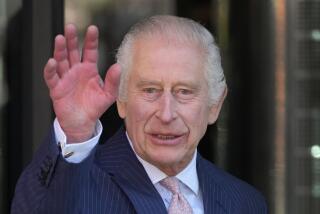Saudis again focused on next leader
- Share via
CAIRO — An impending medical trip to the U.S. by King Abdullah of Saudi Arabia has renewed attention on the kingdom’s aging leadership and raised questions of succession in the world’s leading oil exporter.
The Saudi government has stated that the 86-year-old monarch needs treatment for a blood clot around a ruptured disc in his back. The news comes after the king canceled a ministers’ meeting and relinquished his duties overseeing the annual Muslim pilgrimage to Mecca to Interior Minister Prince Nayif ibn Abdulaziz.
“The king will leave on Monday for the United States to complete medical tests,” the Saudi Press Agency said.
Abdullah also has stepped down as head of the national guard, assigning his son, Prince Muteb, to the post. The frailty of the nation’s leadership was further highlighted when Crown Prince Sultan, 82, who has been recuperating in Morocco after being treated for what is believed to be cancer, returned home to act as king in Abdullah’s absence.
Abdullah, who has tried to curtail the power of religious fundamentalists in the royal family, is a close U.S. ally in countering terrorism and Iran’s influence in the Persian Gulf. The kingdom recently negotiated a deal with the Obama administration to buy $60 billion worth of U.S. military equipment.
The king was photographed days ago in a wheelchair. His age and health are a growing concern, especially given Sultan’s medical problems. Many analysts believe that Nayif, an Islamic conservative who in 2009 was named second deputy prime minister, is likely to ascend to the throne after Abdullah’s death.
“There is no dispute in the line of succession. It’s the king, then the crown prince and then Nayif,” said Mustafa Alani, senior advisor at the Gulf Research Center in the United Arab Emirates. “The king named Nayif second deputy prime minister to secure succession and give a clear line on how power will be passed down.”
Others have questioned whether competing princes will allow a smooth transition.
In a paper published last week, Simon Henderson of the Washington Institute for Near East Policy noted the timing of Muteb’s appointment along with political jockeying and health problems within the family.
Henderson wrote that such scenarios have led to “speculation that rivalry between the king and various senior princes is peaking. It remains to be seen whether leadership change in the kingdom -- the world’s largest oil exporter and home of the two holiest places in Islam -- will be carefully choreographed or lead to open squabbling.”
The king’s condition does not appear to be life-threatening, and he is likely to remain in control, said Emad Gad, an analyst at Al Ahram Center for Political and Strategic Studies in Cairo.
“Abdullah has been a man of transparency and has always been honest regarding issues like his health. I don’t think that for the time being his health is worse than what has been announced,” Gad said. “We have to give the man credit that he has had the courage to be shown in the media in a wheelchair.”
Abdullah became king in 2005 but has run Saudi Arabia since 1996, when the since-deceased King Fahd suffered a stroke.
Amro Hassan, a news assistant in The Times’ Cairo Bureau, contributed to this report.
More to Read
Sign up for Essential California
The most important California stories and recommendations in your inbox every morning.
You may occasionally receive promotional content from the Los Angeles Times.











